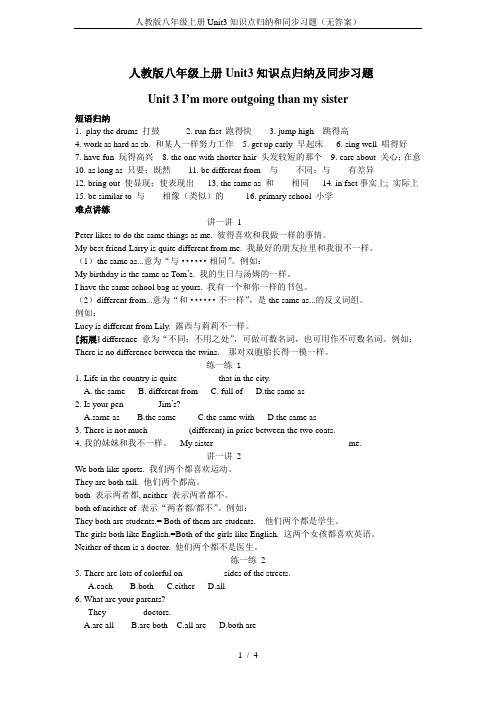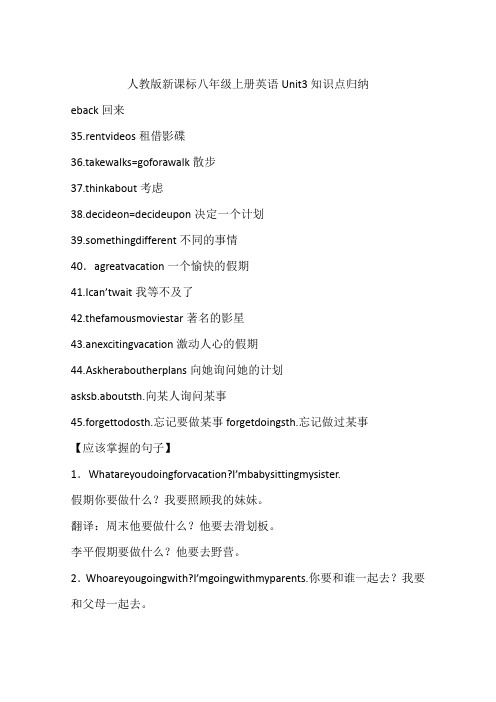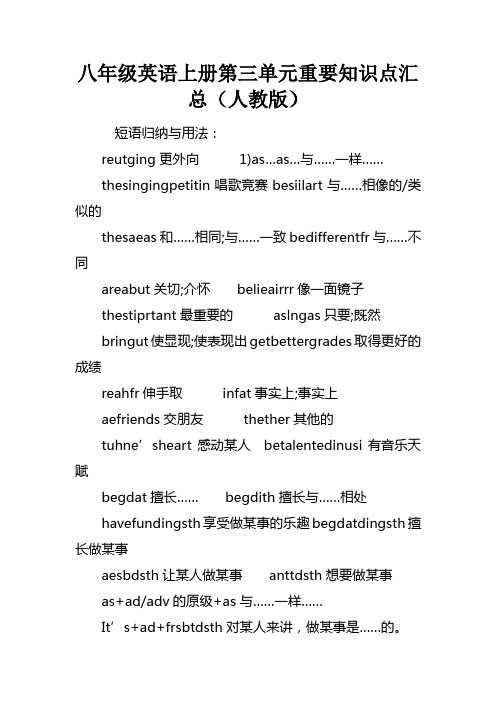人教版八年级英语上册unit3应会知识点
八年级上册英语unit3重点归纳

八年级上册英语unit3重点归纳全文共3篇示例,供读者参考篇1Unit 3 in the eighth-grade English textbook covers a wide range of topics and vocabulary that are essential for students to learn and understand. In this unit, students will learn about hobbies, interests, and activities they enjoy, as well as how to express their likes and dislikes. Additionally, students will learn how to talk about past experiences, discuss future plans, and ask for suggestions from others.One of the key focuses in this unit is vocabulary related to hobbies and activities. Students will learn new words such as painting, reading, swimming, gardening, and playing sports. They will also learn how to use these words in sentences to talk about their own hobbies and interests. For example, "I enjoy painting in my free time" or "I love reading mystery novels."In addition to vocabulary, students will also learn grammar structures that are important for talking about past experiences and future plans. They will learn how to use the simple past tense to talk about things they did in the past, as well as the simplefuture tense to talk about things they will do in the future. For example, "Last weekend, I went hiking with my friends" or "Next summer, I plan to travel to Europe."Another key aspect of this unit is learning how to ask for suggestions from others and give recommendations. Students will learn phrases such as "What do you think I should do?" or "Can you recommend a good book for me to read?" These phrases will help students engage in conversations with others and seek advice when needed.Overall, Unit 3 is an important unit that helps students expand their vocabulary, learn new grammar structures, and improve their communication skills. By the end of this unit, students will be able to confidently talk about their hobbies and interests, discuss past experiences, and plan for the future. This unit lays a strong foundation for students to continue building their English skills throughout the school year.篇2Unit 3 in the eighth grade English textbook covers a variety of topics such as hobbies, interests, and free time activities. In this unit, students will learn how to talk about what they like to do in their spare time, describe their hobbies and interests, andask questions about others' preferences. Here is a summary of the key points covered in Unit 3:1. Vocabulary:- Hobbies: activities that people do for pleasure in their free time, such as reading, drawing, playing sports, and playing musical instruments.- Interests: things that attract someone's attention or concern, such as art, music, animals, and nature.- Free time activities: things that people do for enjoyment when they are not working or studying, such as watching movies, going shopping, and hanging out with friends.2. Expressing likes and dislikes:- I like/love/enjoy + verb+ing (e.g., I like reading books.)- I don't like/don't love/don't enjoy + verb+ing (e.g., I don't like playing soccer.)- What do you like doing in your free time?3. Asking questions about hobbies and interests:- What are your hobbies?- What are you interested in?- Do you enjoy playing sports?- How do you spend your free time?4. Responding to questions about hobbies and interests:- My hobbies are reading and drawing.- I'm interested in music and photography.- I enjoy playing the guitar and singing.- In my free time, I like hanging out with my friends.5. Grammar:- Present simple tense: Use the present simple tense to talk about hobbies, interests, and free time activities. (e.g., I play basketball every weekend.)6. Conversation practice:- Role-play conversations about hobbies and interests.- Interview classmates about their hobbies and interests.Overall, Unit 3 is a fun and engaging unit that allows students to practice speaking and listening skills while learning vocabulary related to hobbies and interests. By mastering the key points in this unit, students will be able to confidently talkabout their likes and dislikes, as well as ask questions about others' preferences.篇3Unit 3 in the eighth-grade English textbook covers a variety of important topics, including leisure activities, hobbies, daily routines, and future plans. In this unit, students will learn how to talk about their interests, describe their daily activities, and express their plans for the future.One key focus of this unit is vocabulary related to leisure activities and hobbies. Students will learn a range of new words and phrases related to hobbies such as reading, dancing, painting, playing sports, and listening to music. They will also learn how to use these words in sentences to describe their own hobbies and interests.Another important aspect of this unit is vocabulary related to daily routines. Students will learn words and phrases to describe their daily activities such as waking up, brushing teeth, eating breakfast, going to school, doing homework, and going to bed. They will also learn how to talk about their daily routines in English using the simple present tense.In addition, students will also learn how to talk about their future plans. They will learn how to use future tense verbs to talk about what they will do in the future, such as going to college, getting a job, traveling, or starting a family. Students will also learn how to use phrases like "I plan to" or "I hope to" to express their intentions for the future.Overall, Unit 3 in the eighth-grade English textbook is an important unit that covers a variety of key topics related to leisure activities, hobbies, daily routines, and future plans. By the end of this unit, students will have a better understanding of how to talk about these topics in English and will be able to express their own interests, routines, and plans for the future with confidence.。
人教版八年级上册Unit3知识点归纳和同步习题(无答案)

人教版八年级上册Unit3知识点归纳及同步习题Unit 3 I’m more outgoing than my sister短语归纳1. play the drums 打鼓2. run fast 跑得快3. jump high 跳得高4. work as hard as sb. 和某人一样努力工作5. get up early 早起床6. sing well 唱得好7. have fun 玩得高兴8. the one with shorter hair 头发较短的那个9. care about 关心;在意10. as long as 只要;既然11. be different from 与······不同;与······有差异12. bring out 使显现;使表现出13. the same as 和······相同14. in fact事实上; 实际上15. be similar to 与······相像(类似)的16. primary school 小学难点讲练讲一讲1Peter likes to do the same things as me. 彼得喜欢和我做一样的事情。
My best friend Larry is quite different from me. 我最好的朋友拉里和我很不一样。
(1)the same as...意为“与······相同”。
例如:My birthday is the same as Tom’s. 我的生日与汤姆的一样。
I have the same school bag as yours. 我有一个和你一样的书包。
八年级上册英语unit3重点归纳

八年级上册英语Unit3重点归纳Embarking on our exploration of Unit 3 in Grade Eight English, we dive into a world brimming with exciting topics and essential language skills. This unit offers us not just vocabulary but also cultural insights and opportunities to hone our communication abilities. Let's delve right in!Key Vocabulary Spotlight: The cornerstone of any language learning journey is its vocabulary. In this unit, expect to encounter words that paint vivid pictures –adjectives like 'spectacular', verbs like 'wanderlust-inducing', and nouns such as 'historical landmarks'. Master these word gems and you'll find yourself weaving tales full of charm and depth.Grammar Gems for Enhancement: Grammar holds the key to unlocking the intricacies of English expressions. Here, we focus on present perfect tense and its wonders in narrating past experiences up until now ("I have visited five countries so far."). Embracing this tense enriches your storytelling capabilities, making each account come alive with precision and clarity.Cultural Insights Galore:Beyond mere linguistic pursuits, Unit 3 takes us on virtual tours across continents, immersing us in diverse cultures. From the bustling streets of Rome to the serene temples of Asia, every page whispers stories of heritage, customs, and traditions. Engage deeply with these narratives; let them broaden your horizons beyond textbooks.Reading Comprehension Skills Boost:Reading passages carefully crafted around our theme encourage critical thinking and deeper understanding. As you navigate through articles discussing famous monuments or biographical sketches, practice skimming for main ideas and scanning for details. Sharpen your comprehension skills by summarizing what you read aloud –it helps solidify knowledge within.Speaking & Writing Opportunities Abound:Practice makes perfect, especially when honing oral and written fluency. Group discussions centered around cultural differences or debates about conservation efforts foster confidence while enhancing vocabulary application. Don't shy away from penning essays exploring personal connections to historical sites; they are windows to your thoughts and emotions.In conclusion, Unit 3 presents a smorgasbord of treasures waiting to be uncovered. By mastering its core vocabulary, grasping essential grammar rules, soaking up cultural nuggets, boosting reading comprehension, and embracing speaking and writing challenges, you'll emerge stronger, more knowledgeable, and ready to embark on further adventures in English learning. So, gear up and embrace all that awaits you in this fascinating unit!。
人教版新课标八年级上册英语Unit3知识点归纳

人教版新课标八年级上册英语Unit3知识点归纳eback回来35.rentvideos租借影碟36.takewalks=goforawalk散步37.thinkabout考虑38.decideon=decideupon决定一个计划39.somethingdifferent不同的事情40.agreatvacation一个愉快的假期41.Ican’twait我等不及了42.thefamousmoviestar著名的影星43.anexcitingvacation激动人心的假期44.Askheraboutherplans向她询问她的计划asksb.aboutsth.向某人询问某事45.forgettodosth.忘记要做某事forgetdoingsth.忘记做过某事【应该掌握的句子】1.Whatareyoudoingforvacation?I’mbabysittingmysister.假期你要做什么?我要照顾我的妹妹。
翻译:周末他要做什么?他要去滑划板。
李平假期要做什么?他要去野营。
2.Whoareyougoingwith?I’mgoingwithmyparents.你要和谁一起去?我要和父母一起去。
翻译:王林要和谁一起去观光?他要和他的朋友们一起去。
我要和同学们一起去游泳。
我和父母要去游览长城。
3.Whenishegoingcamping?Heisgoingonthe12thofFebruary,2005. 4.I’mgoingtoTibetforaweek.我要去x藏一周。
翻译:你要去x藏多长时间?他们假期要在家里呆一个月。
5.Whatareyoudoingthere?I’mgoinghikinginthemountains.你在那里要做什么?我要在山区里远足。
6.Showmeyourphotoswhenwegetbacktoschool.我们返回学校时,你把照片拿给我看。
翻译:我来把我的新照片拿给你看看。
人教版八年级英语上册课件:Unit 3 单元知识归纳 (共12张PPT)

八年级英语上册第三单元重要知识点汇总人教版

八年级英语上册第三单元重要知识点汇总(人教版)短语归纳与用法:reutging更外向1)as…as…与……一样……thesingingpetitin唱歌竞赛besiilart与……相像的/类似的thesaeas和……相同;与……一致bedifferentfr与……不同areabut关切;介怀belieairrr像一面镜子thestiprtant最重要的aslngas只要;既然bringut使显现;使表现出getbettergrades取得更好的成绩reahfr伸手取infat事实上;事实上aefriends交朋友thether其他的tuhne’sheart感动某人betalentedinusi有音乐天赋begdat擅长……begdith擅长与……相处havefundingsth享受做某事的乐趣begdatdingsth擅长做某事aesbdsth让某人做某事anttdsth想要做某事as+ad/adv的原级+as与……一样……It’s+ad+frsbtdsth对某人来讲,做某事是……的。
语法知识:IsTsarterthanSa?N,heisn’tSaissarterthanTIsTarareutgingthanTina?N,sheisn’tTinaisreutgingthanTaraAreuasfriendlasursister?N,I’ntI’friendlierDesTararashardasTina?es,shedesh’srehardringatshl?Tinathinsshersharderthane词语辨析:laughv≈n笑ealllaughedludlhensheadeae她说了个笑话,咱们都高声笑起来。
ealllaughedathise听了他的笑话咱们都笑起来。
Helaughsbesthlaughslast谁笑在最后,谁笑得最好。
/不要快乐得太早。
嘲笑Dn’tlaughathi别嘲笑他。
Unit3 sectionB 知识点讲解 人教版英语八年级上册
八年级上册unit3Section B1...likes to do the same things as me. ……喜欢和我做同样的事情。
➢the same.. as..是固定短语,其中same意为“相同的”,其前须有定冠词the。
the same... as...的反义词组是( be) different from...(与……不同,与……有差异)。
【例句】She wears the shoes which are the same color as mine.她穿的鞋和我的鞋的颜色一样。
【例句】He lives in the same city as Danny! 他和丹尼住在同一座城市!2...is good at sports. ……擅长运动。
➢be good at..意为“擅长……方面做得好”,相当于do well in...;介词at后可接名词、代词或动名词作宾语。
【例句】They say you are good at English. 他们说你擅长英语。
接名词【例句】I like to play the piano, but I am not good at it.接代词我喜欢弹钢琴,但我不擅长它。
【例句】He is good at writing articles about country life.接动名词他擅长写关于乡村生活的文章。
3...truly cares about me. ……真正关心我。
➢care about是固定短语,意为“关心;在意”,其后接名词、代词、动名词或从句。
【例句】I don't care about your opinion.我不在意你的意见。
接名词【例句】Lei Feng always cares about others. He doesn't think of himself接代词雷锋总是关心别人,不为自己考虑。
【例句】Do you care about protecting the environment and saving energy?接动名词你关心环境保护和节约能源吗?【例句】Many teenagers don't care about what people think of them.接从句许多青少年不在乎人们对他们的看法。
八年级上册英语unit3重点归纳
八年级上册英语unit3重点归纳Unit 3 of the eighth grade English textbook covers a variety of topics, including personal information, daily routines, hobbies, and plans for the future. In this unit, students will learn how to introduce themselves, talk about their daily schedule, discuss their interests and hobbies, and make plans for the future.One of the key vocabulary words in this unit is "personal information". Students will learn how to say their name, age, nationality, and where they live in English. They will also practice asking and answering questions about personal information, such as "What's your name?" and "Where are you from?".Another important topic in this unit is "daily routines". Students will learn how to talk about what they do every day, including their morning routine, school schedule, andafter-school activities. They will practice using present simple tense to describe routine actions, such as "I wake up at 7:00 am" and "I do my homework in the evening".Hobbies are another key theme in this unit. Students will learn how to talk about their interests and pastimes in English. They will learn vocabulary words for common hobbies, such as reading, playing sports, and listening to music. They will alsopractice using present simple tense to talk about hobbies they do regularly, such as "I play basketball every Saturday".Finally, students will learn how to make plans for the future in this unit. They will practice using future tense to talk about future activities and events, such as "I will go to the movies with my friends next weekend" and "I am going to travel to Japan next year". Students will also learn how to use time expressions, such as "next week", "next year", and "in the future", to talk about future plans.Overall, Unit 3 of the eighth grade English textbook covers a wide range of topics related to personal information, daily routines, hobbies, and plans for the future. By the end of this unit, students should be able to introduce themselves, talk about their daily schedule, discuss their interests and hobbies, and make plans for future activities in English.。
期中复习考点回顾--人教版八年级上册unit 3核心考点归纳
人教版八年级上册unit 3考点梳理【必备短语】和…一样as…as…只要as long as使显现出bring out与…不同be different from..与…类似be similar to与…相处得好be good with…和…都(两者)both…and…在…方面有天赋be talented in关心、在意care about取得好成绩get good grades事实上,实际上in fact更外向more outgoing使某人做某事make sb. do sth交朋友make friends最重要的the most important照顾、照料take care of【本单元常见词比较级】1.good/well better2.long longer3.tall taller4.heavy heavier5.loudly more loudly6.quietly more quietly7.quiet quieter8.friendly friendlier9.smart smarter10.hard-working more hard-working11.early earlierzy lazier13.outgoing more outgoing14.high higher15.hard harder16.fast faster17.serious more serious18.little less19.popular more popular20.many/much more21.important more important22.shy shyer【教材考点归纳】【1】Tara works as hard as Tina. (P. 18)as...as...意为“和……一样”,两个as中间用形容词或者副词原级。
He is as tall as his father.I run as fast as he.【拓展】not as...as...意为“不如……,比不上……”第一个as是副词,在否定句中可以换成so。
八年级上册英语人教版知识点unit3
八年级上册英语人教版知识点unit3 Unit 3:Teenagers should be allowed to choose their own clothesIn unit 3 of the 8th-grade English curriculum published by the People's Education Press, the focus is on the topic of teenagers' clothing choices. The main point of this unit is that teenagers should be allowed to choose their own clothes. This is a topic that has been debated for a long time, and it has become increasingly relevant in recent years. In this article, we will explore the main knowledge points of this unit and explain why it is important to allow teenagers to make their own choices.Part 1: VocabularyIn this unit, students will learn a variety of new vocabulary. Some of the key words and phrases that students will encounter include "style", "dress code", "freedom of expression", "uniform", "peer pressure", and "rebel". It is important for students to understand these words and phrases so that they can comprehend the text and express themselves accurately when discussing the topic.Part 2: Reading comprehensionThe reading comprehension component of this unit focuses on a text entitled "Should Teenagers Be Allowed to Choose Their Own Clothes?" In this article, the author argues that teenagers should be allowed to choose their own clothes because it is a way for them to express themselves and assert their independence. The text also discusses the potential drawbacks of this approach, such as conflicts with school dress codes and peer pressure. Through reading the article, students will learn about the advantages and disadvantages of allowing teenagers to choose their own clothes.Part 3: Listening and speakingIn the listening and speaking component of this unit, students will listen to a conversation between two friends discussing the topic of clothing choices. They will need to answer questions about the conversation and participate in class discussions related to the topic. By engaging in discussions and expressing their own opinions, students will develop their speaking and listening skills and learn how to communicate effectively in English.Part 4: WritingThe writing component of this unit requires students to write a persuasive essay arguing for or against the idea that teenagers should be allowed to choose their own clothes. They will need to outline their reasons and provide supporting evidence. Through this exercise, students will learn how to structure their writing, develop persuasive arguments, and express their ideas clearly in written English.Part 5: Cultural knowledgeIn addition to language skills, this unit also teaches students about cultural differences related to clothing choices. Students will learn how different cultures have different attitudes towards clothing, and how these attitudes can affect the ways in which individuals express themselves. This component of the unit helps to cultivate students' cultural awareness and sensitivity.ConclusionOverall, unit 3 of the 8th-grade English curriculum published by the People's Education Press is an important and valuable part of the curriculum. By learning about clothing choices and expressing their own ideas, students will develop their language skills, critical thinking abilities, and cultural awareness. This unit is an excellent example ofhow language education can go beyond basic language skills and help students develop a broader range of knowledge and abilities.。
- 1、下载文档前请自行甄别文档内容的完整性,平台不提供额外的编辑、内容补充、找答案等附加服务。
- 2、"仅部分预览"的文档,不可在线预览部分如存在完整性等问题,可反馈申请退款(可完整预览的文档不适用该条件!)。
- 3、如文档侵犯您的权益,请联系客服反馈,我们会尽快为您处理(人工客服工作时间:9:00-18:30)。
一写出下列单词的比较级最高级
1.smart
zy
3.outgoing
4.hard-working
5.shy
6.far
7.little 8.many/much 9.early
10.thin 11fat 12.high te
二
1.两者都
2.三者或三者以上都用法:
3.感动;触摸
4.分享
5.最初的;最早的
6.信息;消息
7.心脏;内心
8.谚语
9.应该+ 10.取得好成绩11.实际上12.与…相同13.与…不同
14.与…相似15.到达(三种)
16.使显现17.关心;在意18.在某方面有天赋
19.唱歌比赛20.只要;既然21.make用法
22.擅长于23. 以…号码给…打电话24.做…是有必要的
25.善于应付…的
一写出下列单词的比较级最高级
1.smart
zy
3.outgoing
4.hard-working
5.shy
6.far
7.little 8.many/much 9.early
10.thin 11fat 12.high te
二
1.两者都
2.三者或三者以上都用法:
3.感动;触摸
4.分享
5.最初的;最早的
6.信息;消息
7.心脏;内心
8.谚语
9.应该+ 10.取得好成绩11.实际上12.与…相同13.与…不同
14.与…相似15.到达(三种)
16.使显现17.关心;在意18.在某方面有天赋
19.唱歌比赛20.只要;既然21.make用法
22.擅长于23. 以…号码给…打电话24.做…是有必要的
25.善于应付…的。
